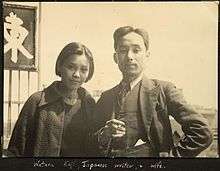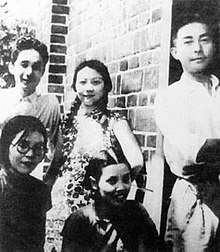Wataru Kaji
Wataru Kaji (鹿地 亘, Kaji Wataru, 1903–1982)[1] or (1901–1982) was the nom de guerre for Mitsugi Seguchi (瀬口 貢 Seguchi Mitsugi), a Japanese writer, literary critic, and political activist.[2]
Biography
Wataru Kaji was born in Kyushu in 1903. He became involved with activism. In January 1936, he fled to China. He arrived in Shanghai, where he married Yuki Ikeda.[3]
While in China, Kaji met Lu Xun,[4][5] Hu Feng,[6] Xiao Hong.[7] Edgar Snow, and[8] Koji Ariyoshi.[9] In December 1939, Kaji founded the Japanese People's Anti-war Alliance.[10]


Kaji and Ikeda fled Shanghai following the outbreak of the Second Sino-Japanese War. Kaji worked for the Chinese, and re-educated Japanese POWs.[3]
Kaji was kidnapped in 1951 by U.S intelligence, and was held for more than a year.[11]
Wataru Kaji died when he was 79 years old.[12]
Legacy
The Chinese Documentary series "Today In The History Of Anti-Japanese War" dedicated an episode to Kaji.[13]
Wataru Kaji was featured in the "International Friends during the Anti-Japanese War". A show organized by the Beijing People's Association for Friendship with Foreign Countries. The show "features 160 pictures of 39 foreign friends who worked together with the Chinese people and made contributions to China's independence and freedom."[14]
See also
- Teru Hasegawa
- Japanese dissidence during the Shōwa period
- Japanese in the Chinese resistance to the Empire of Japan
- Japanese People's Anti-war Alliance
References
- Library of Congress Name Authority File. Accessed 19 January 2014
- Derek Challis (2002). The Book of Iris: A Biography of Robin Hyde. Auckland University Press. p. 542.
- Roth, Andrew (1945). Dilemma in Japan. Little, Brown. pp. 234–243.
- Koshiro, Yukiko (2013). Imperial Eclipse Japan's Strategic Thinking about Continental Asia before August 1945. Cornell University Press. p. 100.
- Empire of Texts in Motion Chinese, Korean, and Taiwanese Transculturations of Japanese Literature By Karen Laura Thornber Page 75
- Literary Societies of Republican China edited by Michel Hockx and Kirk A. Denton Chapter 13 Page 458
- "Seminar: Home Away From Home: Displacement and Cosmopolitanism in the Itinerary of Xiao Hong". University of Hong Kong.
- From Vagabond to Journalist: Edgar Snow in Asia, 1928-1941 By Robert M. Farnsworth Page 326 -327
- From Kona to Yenan: The Political Memoirs of Koji AriyoshiBy Koji Ariyoshi, Alice M. Beechert, Edward D. Beechert page 104-105
- Empire of Texts in Motion: Chinese, Korean, and Taiwanese Transculturations", Karen Laura Thornber, Page 75
- Yakuza: Japan's Criminal Underworld By David E. Kaplan, Alec Dubro Page 47
- "Political writer Kaji died at 79". The Miami News.
- 抗战史上的今天 12月19日 鹿地亘对记者谈反战同盟 (in Chinese). 【抗战史上的今天】官方频道---纪念中国人民抗日战争暨世界反法西斯战争胜利70周年. Dec 20, 2015.
- "Int'l friends photo exhibition unveiled in Beijing". This is Beijing. July 23, 2015.
Further reading
- 井上 桂子 (2012). 中国で反戦平和活動をした日本人―鹿地亘の思想と生涯. 八千代出版.
- Records of the Office of Strategic Services (Record Group 226) 1940-1947 | Entry 211 | Boxes 1-45. Location: 250/64/32/1. CIA Accession: 85-0215R. at the National Archives and Records Administration
- Pingchao Zhu (2015). Wartime Culture in Guilin, 1938–1944: A City at War. Lexington Books.
- Pingchao Zhu (2015). Wartime Culture in Guilin, 1938–1944: A City at War. Lexington Books. pp. 175–180.
External links
- "중국과 함께 했던 외국적 항일투사(사적)7-가지 와타루". 국가공공추도망 (The National Memorial). 30 June 2015.
- "John Young Obituary". ObitsforLife.com.
- "Chinese Attack Japs Today Near Shanghai Limits". The Daily Times. May 23, 1938.
- "Japs, Despondent Over War, Reported Ending Lives". St. Petersburg Times.
- "Sino - Japanese friendship urged". Tribune.